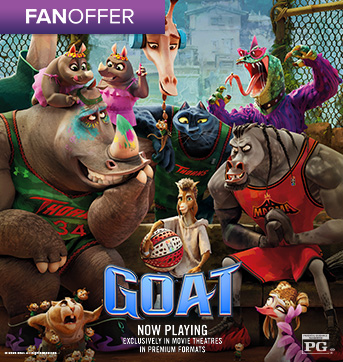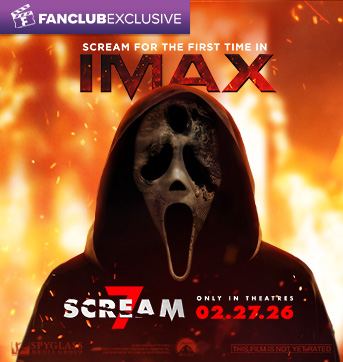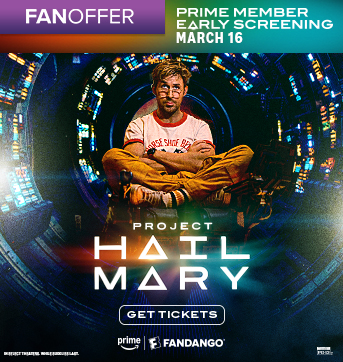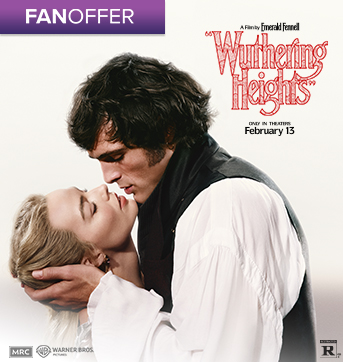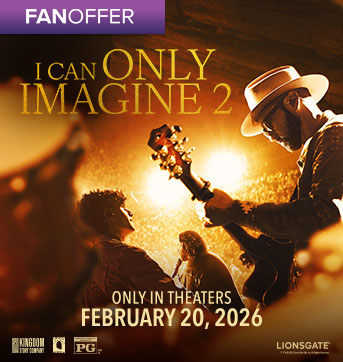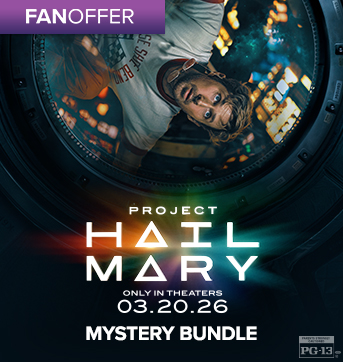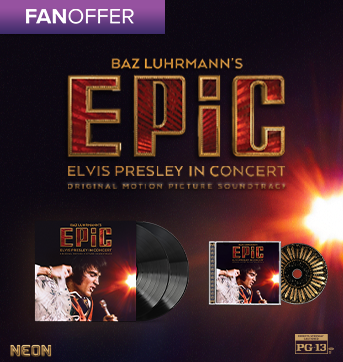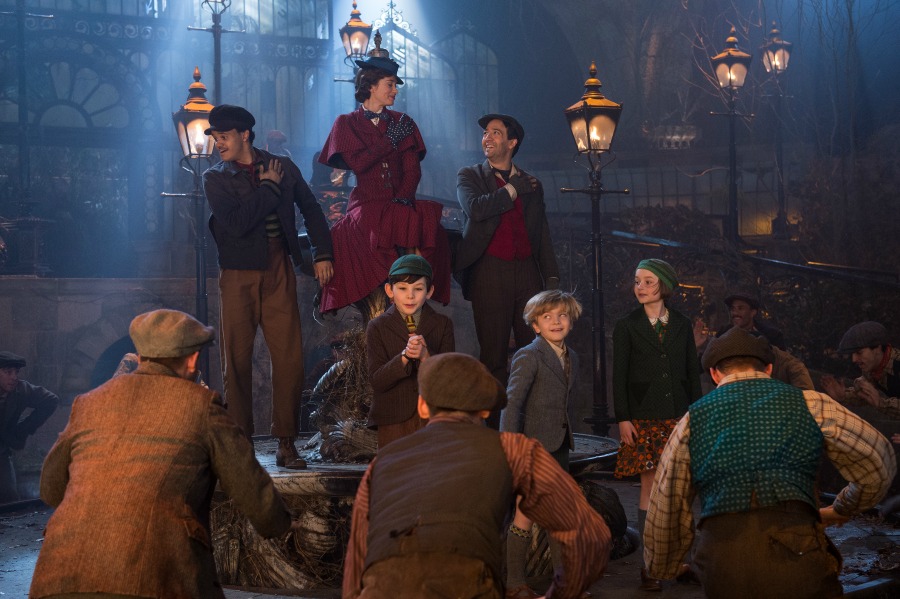
Exclusive Image: Emily Blunt, Lin-Manuel Miranda and cast perform a big musical number from Mary Poppins Returns entitled, "Trip A Little Light Fantastic."
It's been 54 years since Mary Poppins last graced us with her colorful and spirited presence on the big screen, but now she's back in Mary Poppins Returns (in theaters December 19) -- this time beautifully played by Emily Blunt -- in a story that picks up years later, in Depression-era London, with the Banks' children all grown up and in desparate need of a little Mary Poppins back in their lives.
With tickets now officially on sale for Mary Poppins Returns here at Fandango, we sat down for an exclusive conversation with director Rob Marshall, who is no stranger to the big-screen musical, having previously directed Chicago, Nine and Into the Woods. With Mary Poppins Returns, Marshall reteams with his Into the Woods star Emily Blunt for a big family adventure full of love, life and, well, music. How does the sequel compare to the original? Has original Mary Poppins Julie Andrews watched the new film yet? And why, after 54 years, is now the time to bring Mary Poppins back into all our lives? Read on for those answers and lots more.
Fandango: Mary Poppins is a character who comes back into these characters' lives when they most need her and I feel like that could be said for all of us. Why do you think, after 54 years, now is the time to bring Mary back into our lives?
Rob Marshall: Well, what a beautiful question! I have to say it was really why the film was done for me, personally. I felt that, in this rather dark time in our culture, that it was important to remember the light and the ray of hope that this character brings to peoples' lives. And, simultaneously, I also felt like I know the musicals that lifted me as a child - movie musicals that I was lucky enough to be a part of that generation, like Mary Poppins, like My Fair Lady, like Oliver or Sound of Music.
Those are these sort of grand musicals, big event musicals that were so exciting to go and see with my family. And also it just brought such a sense of joy and wonder into my life. I felt, like, as things get darker in the world, we have to be reminded of that. We have to be reminded that there's a reason to get up in the morning. It's how you perceive your life, how you look at life, how you approach life, which is really Mary Poppins' lesson. She sees things through a child's eyes. To see things that way - it's not, you know, a lot of people are quite cynical and think, "Oh, well that's just so frivolous." But it's so important. And it's the thing that, I think, heals you in your life. And I think this could be a very healing film.
Fandango: The original Mary Poppins is, of course, a Disney classic. But there may be kids that still haven't seen it. Would you say that you need to see the first film before you see this one?
Rob Marshall: For me, the most important thing is story. I've seen a lot of wild CGI work that just means nothing if you're not invested in some kind of story. So, the key for me was finding a story. The P.L. Travers books are filled with adventures, but there's zero narratives to any of P.L. Travers' books. This is not how she approached the work.
She creates this extraordinary character. This enigmatic, this serious, wonderful character, and this great setup, this incredible world. But there's no narrative. And so, that was something that we had to create on our own; and I really wanted to find something that you could hook into and feel, like, there's somewhat of an accessibility to it. That's what led us to this idea of setting it in the '30s. It's actually when the original books were set. She started writing books in 1934.
If you look at the books, it's really fascinating. If you read the books, you feel the Depression era in those books. She talked about the bank being broken, and she talks about 17 Cherry Tree Lane being the shabbiest house on the street. So, I wanted to set it in that time where people are struggling to make ends meet. Also, this particular family is struggling because there's a lot going on. The wife of grown-up Michael Banks has passed away, and he has three children, and they lost their mother. There's a real sense of loss, and a real sense of the loss and wonder and joy in the house as well, so she really needed to come.
My focus was to work from story. That was the key for me. And then, the adventures are all rooted in a real reason to be there. They're there to heal the family. They're there to help the family find their way. Mary Poppins has this master plan that she works through. That master plan is what she puts in place; and that sets it on a course. Out of that story comes the visual work. That's what I try to do. I try to create a visual world with the fantasies. They're all very different. One is entirely animation. But to live in juxtaposition with this real world of London and Depression-era London.
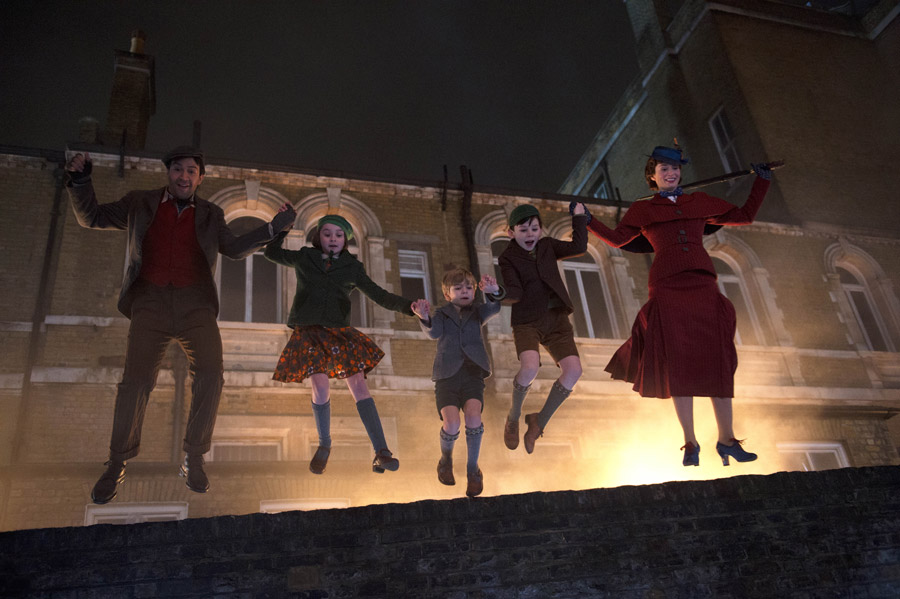
Fandango: Talk about the search for the new Mary Poppins. Was it Emily Blunt right from the start, or was there a lot more to it?
Rob Marshall: From the start. Honestly, when the project came my way, the first person that popped into my mind was Emily and there was no one else. You would think it's the hardest decision of all, but it was actually the easiest because I honestly think there's no one else on this planet that could play that role. I honestly feel that. I don't feel anyone could really play the role the way she does because it's such a tall order. You are looking for someone to replace the extraordinary Julie Andrews. I'm sure they felt this way when they were looking for the next James Bond.
With these iconic characters, you have to find someone who can really do something special with it. And I knew she's a great actress that could play the many layers to Mary Poppins. On the façade, she's very stern and reserved; and underneath, there's a humanity that has a great deal of warmth and humor, all of that. Emily just has all that. Plus, she sings. Plus, she dances. Plus, she's British. It was so perfect. It was clear as a bell to me.
Fandango: A lot of people talk about Dick Van Dyke coming back. Was it easy to convince him to come back? Talk about that conversation.
Rob Marshall: It was the most thrilling phone call of my life, to be able to call him. He's a huge hero for me in so many ways, from all the movies, from Mary Poppins to Chitty Chitty Bang Bang to, of course, his incredible television show. I'm his biggest fan. To be able to talk to him and ask him to be a part of this, and he said yes immediately.
When he came on to our set after many months, we had been rehearsing and shooting and so forth, and then he came, the anticipation was so high. When he arrived, he grabbed me as he walked on to the set. He said, "I have to tell you something, Robert." I said, "What is it, Mr. Van Dyke?" And he said, "I feel the same spirit here on this set that I did on the first movie. I feel the same." And that was the greatest compliment ever, that he felt that spirit, which is truly what I was aiming for; because I knew that we were doing something incredibly special.
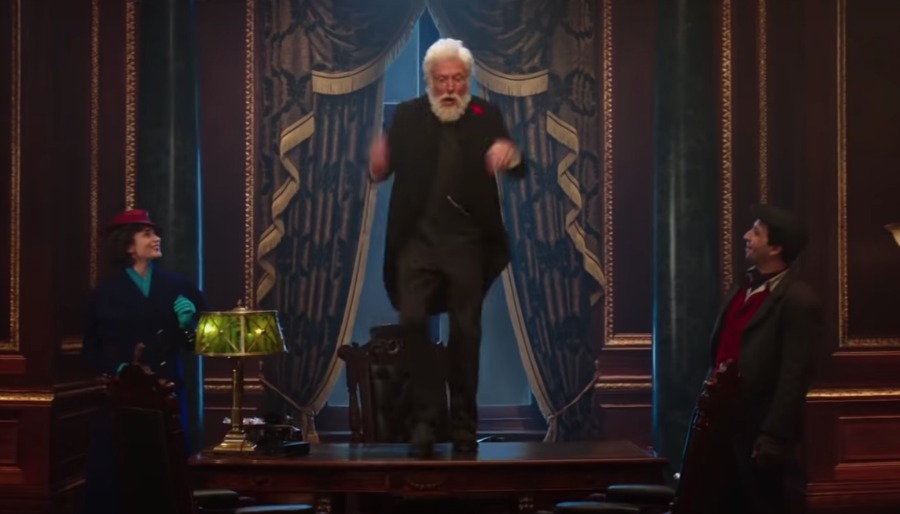
Fandango: That's sweet. I heard there was a scene where he has a monologue and it was so moving that it made you cry.
Rob Marshall: It's true. First of all, I couldn't believe his facility. He was 91 when he shot the film. He's 92 now. He is an extraordinary actor. That's the thing you forget. Here he is, telling them this story; he's telling the children a story of Michael Banks, the little boy, and how he gave away his tuppence. It was this unbelievable combination of the story that he's telling, that it is Dick Van Dyke, that after 54 years, he's doing another Mary Poppins, the sequel to Mary Poppins; and it's my film and I'm shooting him.
It was completely overwhelming to me. He finished the monologue and I couldn't say the word cut. I couldn't say it. I couldn't. I was in tears. I couldn't even speak. It all came full circle for me. This was the first film I ever saw as a child. I was four years old. The whole thing was just overwhelming. I said, well, this is one of the great moments of my life.
Fandango: Oh, wow. So Mary Poppins the first movie you ever watched in a theater?
Rob Marshall: In a theater, yes. My parents took me to a theater in Pittsburgh to see Mary Poppins. I was four years old. My sisters, five of us went. I've got two sisters. It was life changing. As a child, can you imagine seeing something like that? And I'm hoping that some little four year-old boy in Pittsburgh or wherever will go and see our film, my film, and kind of, you know, be swept away into this magical world of wonder and music and magic, all of it.
Fandango: How would you describe the new music in the film as compared to the original? What are they singing about this time around?
Rob Marshall: It's interesting. I would say the one big difference is that ours is, in a way, more like a score. The Sherman brothers' brilliant songs in the original were incredible and so catchy and so iconic, of course. But this one, it feels like an interesting combination of things because it feels very much in the world of Mary Poppins. It feels like a continuation of those incredible songs and they're very catchy and really fun and diverse and great.
But also, I think they really move the story forward. I think, in a way, ours is a more complicated plot; so it acts more like a score, a musical score. A musical song score, if that makes sense.
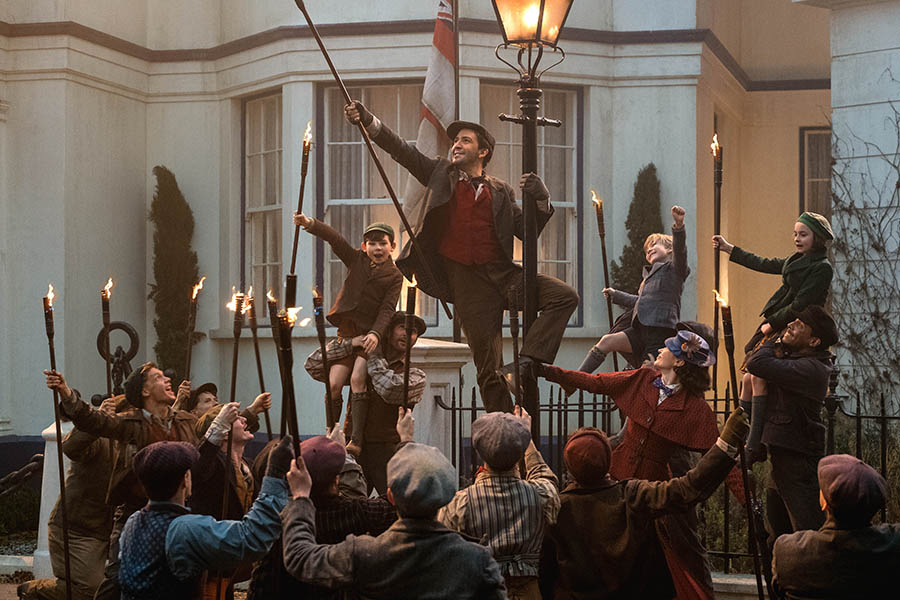
Fandango: The rest of the cast is pretty incredible, too. Lin-Manuel Miranda, Meryl Streep - how did they get involved?
Rob Marshall: Our producer, John DeLuca, came up with this idea with Lin-Manuel Miranda, which I thought was just brilliant. Then we met with him. I have to say, he's so authentic. He's so himself. He has such a childlike spirit, not jaded in any way, shape, or form. He's such a pure vessel of enthusiasm, and he's just so clear. We just thought, oh my gosh, that's Jack. That's his character. This lamplighter who's bringing light to a dark world, and it was incredible. He chose us as the first project off of Hamilton, which we were really honored by that.
And Meryl Streep, I'd worked with on Into the Woods before. When I called her, I wasn't sure if she wanted to do a smaller role. She has her own fabulous number, but it's just that, and I said, would you ever consider it? She was, like, "I've been waiting for you to call." And then she said, "The answer is yes, yes, yes, yes, yes, yes, yes, yes." She felt like I did. She was very keen and felt very passionately about wanting to send this kind of message out into the world now.
Fandango: I know Julie Andrews didn't want to come and do anything because she didn't want to take away from Emily, but do you have any plans to show her the film or have you shown her the film already?
Rob Marshall: Yes, I will. She's a very good friend. I've known her for a very long time. I choreographed Victor/Victoria when I started as a choreographer on Broadway in the '90s. I've known her forever. She's so excited to see it. She adores Emily. What's interesting is she said, you know, that she, right now, has an incredible deadline on the second half of her memoir, which she's very excited about. So she said, "I want to see it when I'm completely clear of that crazy deadline. I want to see it completely fresh." She's so excited to see it, so we'll show it to her soon.
Fandango: Lastly, before I let you go, are you still working on the Little Mermaid movie? Is that next for you after this?
Rob Marshall: That's percolating right now. I'm starting to see if I can find my way into the film. It's a complicated film to do as a live action film, so we're working on it right now. We'll see. I'm hoping I can find my way in and find exciting ways to bring that to the screen.
Mary Poppins Returns hits theaters on December 19. Grab your tickets right now here at Fandango.


